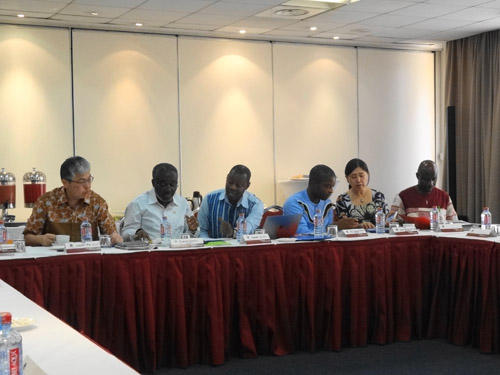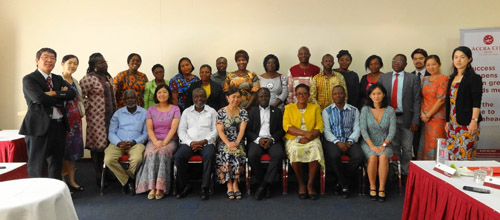Project News
2018-10-05
The first Joint Coordination Committee meeting
The first Joint Coordination Committee (JCC) meeting was held on 5th October 2018 in Accra, Ghana. JCC was established to coordinate among the stakeholders for the effective and successful implementation of the project, and the meeting is held bi-annually. The main agenda of the first JCC meeting was to report the progress of the project and discuss planning of the activities for the next 12 months. The Project Design Matrix (PDM), a grand design of the project, was also reviewed. Twenty-six participants from Ministry of Health (MOH), Ghana Health Service (GHS), JICA Ghana office, Teaching Hospitals, Christian Health Association of Ghana, Nursing and Midwifery Association, Embassy of Japan in Ghana and JICA experts attended the meeting.
Opening remarks
Dr. Anthony Nsiah-Asare, Project Director, Director General of GHS, in his opening remarks, expressed his gratitude to the cooperation and support of Japan for the development of the Maternal and Child Health Record Book (MCH RB), which he described as a major innovation to improve maternal and child health in Ghana. He added that it was imperative for MOH and GHS to take up the leadership role and to explore innovative ways for sustainable nationwide provision of the book, such as further leveraging the internal and external resources and involving the private sector. Dr. Emmanuel Odame, Acting Director of Policy Planning Monitoring and Evaluation Division, MOH, expressed his appreciation to JICA for their support to Ghana which extended outside health sector to the improvement of infrastructure and capacity building in many sectors, and specifically for their contribution in the development of the MCH RB. He stated that he was happy with the start of the national roll-out of the MCH RB, and the services offered would ultimately contribute to the reduction of maternal and child mortality. He added that the provisions of quality MCH services to all mothers and children was in line with the constitution of Ghana. Mr. Hironobu Hoshi, Chief Representative of JICA Ghana office, stressed on the importance of strategic planning and coordination of the stakeholders under the leadership of MOH and GHS to meet the high expectations of the national rollout of MCH RB, and hoped that the JCC meeting would be an opportunity for the fruitful discussion.

Major inputs and achievement
Dr. Patrick Aboagye, Project Manager, Director of Family Health Division (FHD), GHS, presented major inputs and achievements of the project. This project has three main pillars of activities: national rollout of the MCH RB, intensive capacity development in focus districts of Ashanti Region and the institutionalization of MCH RB program into the health system in Ghana. The project has already conducted a total 12 trainings of trainers (ToT) in all 10 regions in the first six months, which trained 750 facilitators/master trainers (See the project news "Training of District Level Trainers on the New Combined MCH RB in all 10 regions of Ghana"). Together with the training, the sensitization workshops were held in all regions. It covered the introduction of the purposes and the characteristics of the new combined MCH RB and the newly introduced services with the book to managers and leaders of health teams in Region and discussed regional scale up plans. It was a good opportunity for the project to share its operation plan with all regional teams.
There was a discussion on how to conduct trainings for health workers at the district level. While the project trained district-level facilitators in all districts across the country, the project cannot cover all districts for the downstream training. Project Manager stressed the importance of securing fund for the training at district level. Some regions and districts managed to conduct health worker training with the available resources or the Internally generated fund (IGF) at the health facilities. But many districts are struggling to secure funds for the training. There was a discussion on the utilization of external funding as well as the support from the private sector for the training. Project Manager pointed out that the quality of health worker training was more crucial than the funding and suggested the needs for capacity building for effective monitoring and supervision.
Dr. Akiko Hagiwara, Chief Advisor of the project, stressed the importance of the involvement and the coordination of a variety of stakeholders for the scale-up and the sustainability. She added that the project planned to develop audiovisual learning materials as well as training materials such as User guide, Trainer's Guide and Participant's Guide which would be utilized by any partners when they support health worker trainings for MCH RB.
Planned activities
Ms. Esi Amoaful, Deputy Director, Nutrition, FHD, GHS, and the Chief Advisor of the project presented the planned activities for October 2018 to March 2020. As for the national rollout, additional ToT to be conducted to train more facilitators. The first Monitoring and Supervision will be conducted in 10 regions to assess the situation of national roll out. Also, audiovisual learning materials will be produced, especially for some new topics such as the introduction of MCH RB to a mother (‘Dear mother' practice), length measurement, and BMI calculation. Meanwhile in Ashanti Region, a baseline survey and situation analysis will be conducted after the selection of the focus districts. Concurrently, guidelines and protocols on Nutrition Clinic and Respectful Care will be developed. In term of the institutionalization of MCH RB, the management guide will be developed.
Selection criteria for the focused 6 districts
The project is going to start intensive health worker trainings, monitoring and supervision and behavior change communication activities in the focused 6 districts in Ashanti region to realize the effective utilization of the MCH RB for the quality of care, in tandem with the national roll-out activities. At the meeting, the participants discussed and agreed on the selection criteria for the focused 6 districts. The agreed selection criteria are as in following:
- Evidence of undernutrition
- Low uptake of MCH and nutrition services
- Leadership of the districts
- High utilization of the health services within the districts (patients do not go health facilities outside of the district)
- Vicinity of all 6 districts for impact
- Inclusion of WHO learning sites of maternal and childcare quality initiative
According to these criteria, Ashanti region will select the focus districts.
Way forward
The project is going to start the activities in focused 6 district in Ashanti Region as well as to continue the national roll-out. We will work together as a team and overcome all obstacles and challenges to establish and sustain the MCH RB as a national program and promote quality MCH and Nutrition services to all mothers and children in Ghana.

- About JICA
- News & Features
- Countries & Regions
- Our Work
- Thematic Issues
- Types of Assistance
- Partnerships with Other Development Partners
- Climate Change / Environmental and Social Considerations
- Evaluations
- Compliance and Anti-corruption
- Science and Technology Cooperation on Global Issues
- Research
- JICA Development Studies Program / JICA Chair
- Support for the Acceptance of Foreign HRs / Multicultural and Inclusive Community
- Publications
- Investor Relations
